Air Source Heat Pumps
How does an Air or Ground Source Heat Pump work?
Basic Principle
An air-to-water heat pump functions similarly to other heat pumps: it extracts thermal energy from the air, raises the temperature through a refrigeration cycle, and then transfers that heat to water. This heated water is circulated through the home for space heating or hot water.
Components of an Air-to-Water Heat Pump
Outdoor Unit: Contains the evaporator coil and fan, which absorb heat from the outside air.
Refrigerant Circuit: A closed loop where refrigerant flows and undergoes phase changes (from gas to liquid and vice versa) to move heat.
Compressor: Compresses the refrigerant, increasing its temperature.
Heat Exchanger (Condenser): Transfers the heat from the refrigerant to the water in the system.
Water Pump: Circulates the heated water through the heating system or hot water storage tank.
Indoor Unit: Distributes the heated water to radiators, underfloor heating systems, or hot water taps.
Efficiency and Cold Weather Operation
Energy Efficiency: Like other heat pumps, AWHPs are highly efficient. For every unit of electricity they use, they can provide 2-4 units of heat, making them far more efficient than traditional electric or gas boilers.
Cold Climate Performance: Modern AWHPs are designed to operate effectively even in cold climates, though their efficiency can drop as the outdoor temperature reduces.
Key Advantages
Energy Savings: AWHPs consume much less energy than conventional heating systems, leading to lower energy bills.
Low Carbon Emissions: Since AWHPs primarily rely on electricity to operate and extract free heat from the air, they produce significantly fewer carbon emissions than fossil fuel-based heating systems.
Versatility: AWHPs can heat both water and indoor spaces, offering a single solution for multiple needs.
Renewable Energy Source: They harness energy from the outside air, which is a renewable and sustainable energy source.
Integration with Renewable Energy
Air-to-water heat pumps can be paired with solar panels or other renewable energy systems, further reducing carbon emissions and operational costs. For example, excess electricity generated by solar panels can power the heat pump, making the entire system more eco-friendly.
Summary
Air-to-water heat pumps work by extracting heat from the outside air, compressing and concentrating it, and transferring that heat into water for space heating or hot water. They are highly efficient, environmentally friendly, and can be used in a variety of applications, from heating buildings to providing domestic hot water.
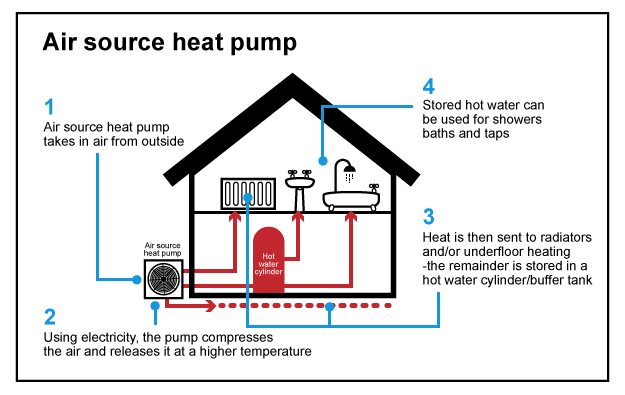

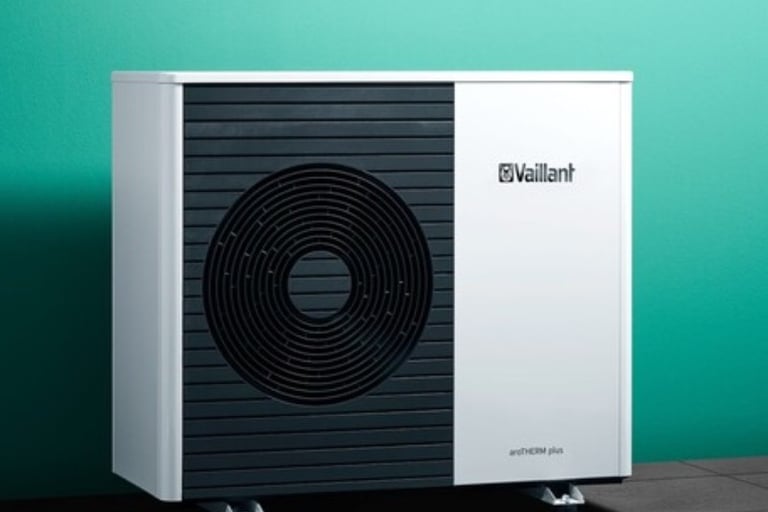

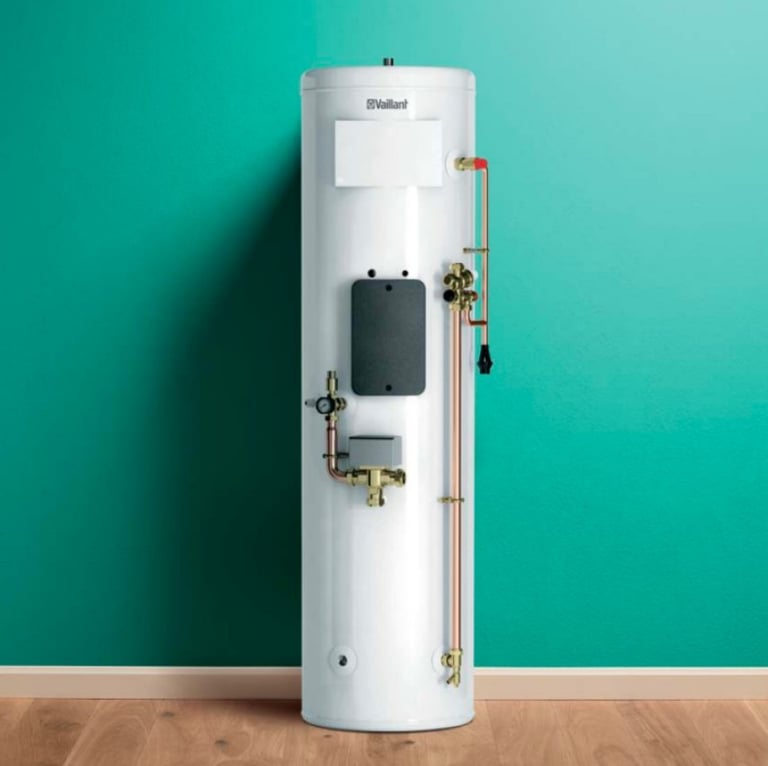

Benefits of Air Source Heat Pumps
1. Energy Efficiency
Reduced Energy Consumption: ASHPs are highly efficient, using less electricity to produce the same amount of heat compared to conventional heating systems like electric heaters or gas boilers.
COP (Coefficient of Performance): For every unit of electricity consumed, ASHPs can deliver 2-4 times the energy in the form of heat.
2. Environmentally Friendly
Lower Carbon Emissions: Since ASHPs rely on electricity rather than fossil fuels, they contribute to lower carbon emissions, especially when used in combination with renewable electricity sources.
Reduced Dependency on Fossil Fuels: By using ambient air as a heat source, ASHPs help reduce reliance on natural gas, oil, or coal for heating.
3. Heating and Cooling Capabilities
Dual Functionality: ASHPs can both heat and cool a building, making them versatile for year-round comfort.
Reversible Operation: In the summer, ASHPs can reverse the flow to function as an air conditioner, extracting heat from indoors and releasing it outside.
4. Cost Savings
Lower Operating Costs: Despite the upfront installation cost, ASHPs often result in lower energy bills due to their high efficiency, especially in well-insulated homes.
Government Incentives: Many countries and regions offer financial incentives, rebates, or tax credits for installing ASHPs, making them more affordable.
5. Low Maintenance
Minimal Maintenance Needs: ASHPs typically require less maintenance than traditional combustion heating systems. Regular cleaning and periodic checks are usually enough to keep them running efficiently.
6. Space-Saving
Compact Design: ASHPs don’t require extensive space for fuel storage or large-scale equipment, making them suitable for urban areas or homes with limited outdoor space.
7. Improved Air Quality
No Combustion or Pollutants: Unlike gas or oil boilers, ASHPs don’t produce harmful combustion gases, improving indoor air quality.
Dehumidification: When used for cooling, ASHPs can help dehumidify the air, improving comfort.
8. Scalability
Adaptability to Different Environments: ASHPs can be installed in various building types, from small residential homes to larger commercial spaces.
Works in Different Climates: While more efficient in moderate climates, modern ASHPs can still provide heating in colder temperatures.
9. Compatibility with Other Systems
Can Be Integrated with Other Technologies: ASHPs can be combined with underfloor heating, radiators, or solar panels to maximize energy efficiency.
10. Long Lifespan
Durability: ASHPs generally have a long lifespan (15-20 years), especially with regular maintenance, providing long-term savings and environmental benefits.
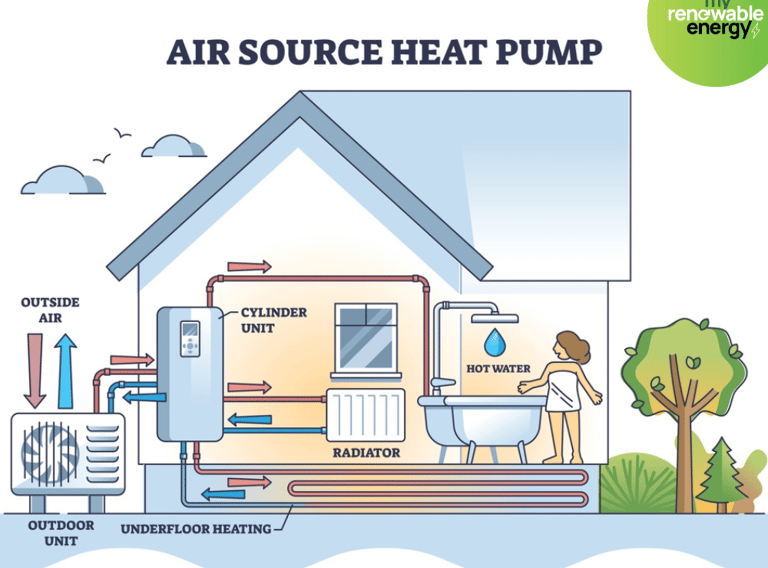

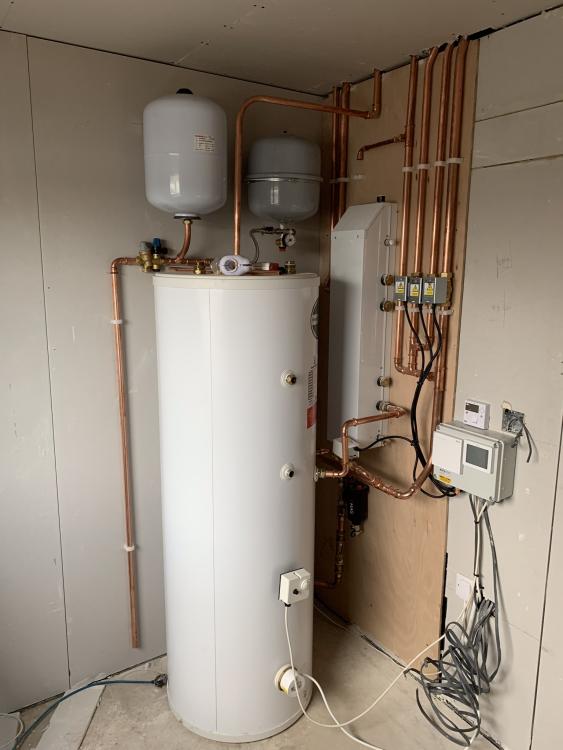

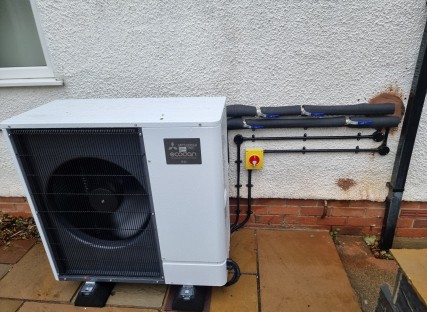

Boiler Upgrade Scheme (BUS)
The Boiler Upgrade Scheme supports the decarbonisation of heat in buildings. It provides upfront capital grants to support the installation of heat pumps and biomass boilers in homes and non-domestic buildings in England and Wales.
Acting on behalf of property owners, installers can apply for:
£7,500 off the cost and installation of an air source heat pump
£5,000 off the cost and installation of a biomass boiler
£7,500 off the cost and installation of a ground source heat pump, including water source heat pumps
£450 million of grant funding is available over three years from 2022 to 2025.


Contact
Services
© 2026. All rights reserved.


Unit 1 Crewkerne Business Park, Northern Way Cropmead, Crewkerne Somerset, TA18 7HJ
About
Company registration number: 14753951
VAT Number: 463454386
